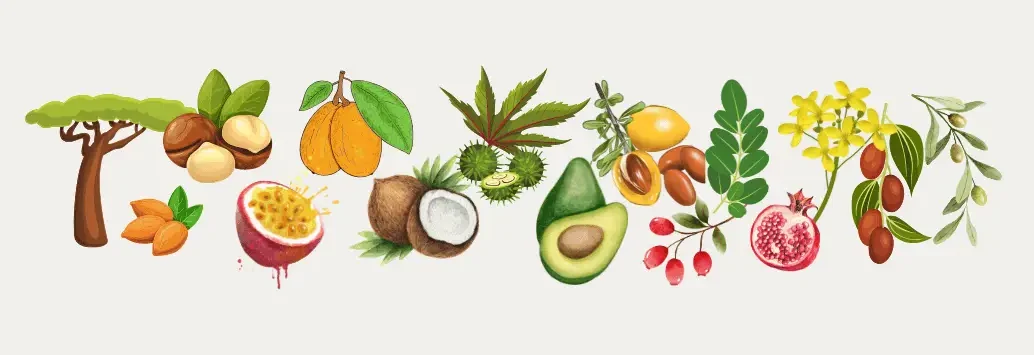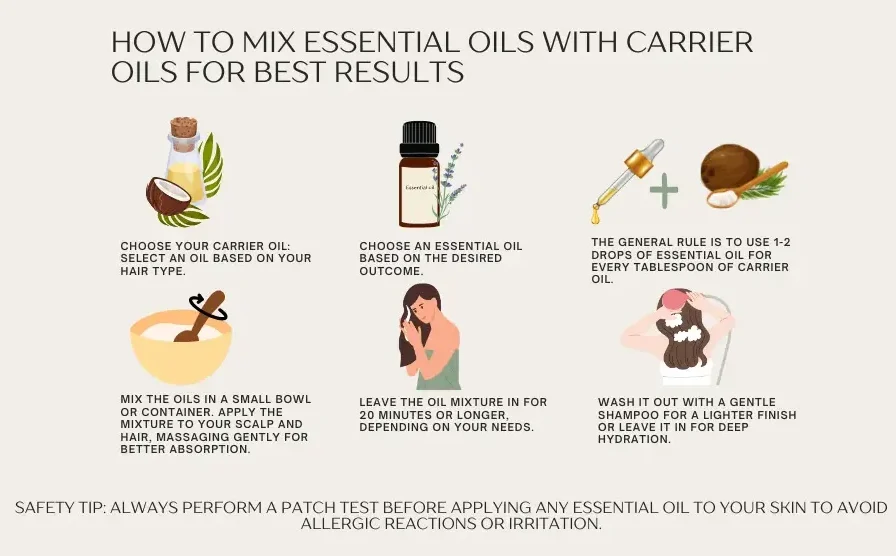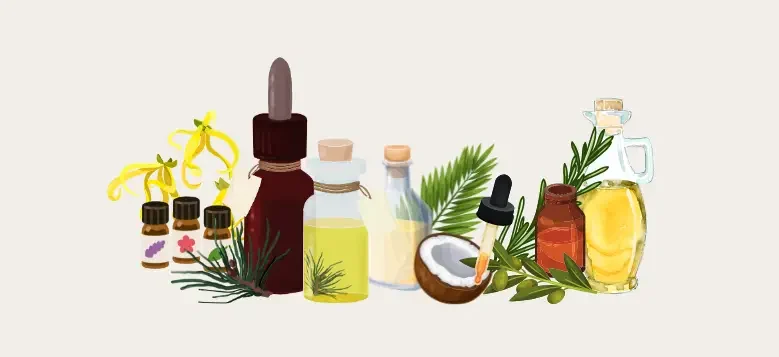
Natural oils for hair health have been used for centuries to make hair stronger and healthier.For example, in ancient Egypt, oils were used to help hair grow and stay healthy. In India, Ayurvedic traditions used oils to make hair stronger and prevent graying.Also African cultures also used natural oils and butters to protect and nourish hair. These old traditions show the lasting benefits of natural oils for hair health.
Till today, natural oils for hair health are still important in self-care routines. With so many oils to choose from, it can be hard to know which one is right for you.But ,don’t worry! In this guide, We’ll explore the benefits of natural oils and how to use them. We’ll help you transform your hair care routine. Stay tuned to learn how these simple oils can bring health to your hair.
When it comes to hair care, understanding the difference between natural oils for hair and essential oils can help you make more informed choices. Natural oils (also called carrier oils )are derived from the fatty portions of plants, such as seeds, nuts, or fruits. They are rich in vitamins, antioxidants, and healthy fats that can deeply moisturize and nourish the scalp and hair strands. Popular examples include coconut oil, argan oil, and jojoba oil.These oils are often applied directly to the hair or scalp and can be used as part of conditioning treatments or even as a daily styling aid.

On the other hand, essential oils are highly concentrated extracts obtained from aromatic plants. Unlike natural oils, they are not fatty and are typically used in smaller amounts due to their potency. Essential oils like lavender, tea tree, and peppermint are widely celebrated for their ability to support scalp health.Because of their strength, essential oils are usually diluted with a carrier oil, before application to avoid irritation.
By incorporating both types of oils into your hair care routine, you can address a variety of needs. Natural oils focus on hydration and nourishment, while essential oils target specific concerns like scalp health and hair growth. Combining the two can create a well-rounded approach that keeps your hair healthy, strong, and vibrant.

Dry scalp and hair are common concerns that can leave your locks feeling brittle and your scalp uncomfortable.
Batana Oil – Deeply moisturizes and nourishes dry, brittle hair. It helps repair and protect the scalp, making hair smoother and softer.
Pumpkin Seed Oil – Rich in essential fatty acids, this oil helps hydrate the scalp and improve hair texture.
Coconut Oil – Moisturizes both scalp and hair, reducing dryness and preventing flakiness.
Argan Oil – Packed with antioxidants, it nourishes dry hair, restores moisture, and reduces frizz.
Baobab Oil – This lightweight oil deeply hydrates and softens the scalp, making hair smoother and more manageable.
Marula Oil – Highly moisturizing, it hydrates dry scalp and promotes healthy hair growth.
Grapeseed Oil – Known for its light texture, it locks in moisture, preventing dry, flaky scalp and brittle hair.
To use, warm a small amount of the oil and massage it into your scalp and strands, allowing it to sit for at least 20 minutes before rinsing thoroughly.

If you’re dealing with slow hair growth or hair loss, certain oils can support healthier hair growth by stimulating the scalp and improving circulation.
Rosemary Oil – Stimulates blood circulation to the scalp, helping to promote hair growth and prevent hair loss.
Castor Oil – Packed with ricinoleic acid, it enhances blood circulation to the scalp and encourages healthy hair growth.
Peppermint Oil – Improves blood flow to the scalp and promotes the growth of new hair.
Black Seed Oil – Rich in nutrients, it strengthens hair roots and supports healthy hair growth.
Amla Oil – Helps reduce hair thinning, strengthens hair follicles, and boosts hair growth.
Tea Tree Oil – Clears the scalp of blockages in hair follicles and promotes healthy growth.
For those with an oily scalp and hair, balancing excess oil production is key. Lightweight oils can actually help regulate sebum production, preventing your scalp from overcompensating with too much natural oil.
Tea Tree Oil – Helps cleanse the scalp and regulate oil production, keeping hair fresher for longer.
Grapeseed Oil – A light oil that hydrates the scalp without making it greasy, ideal for oily hair.
Again, be sure to dilute tea tree oil with a carrier oil before applying to avoid irritation.

Dull, damaged hair can benefit from oils that restore shine and repair the hair cuticle.
Argan Oil – packed with vitamin E and fatty acids that smooth and protect the hair, leaving it shiny and manageable.
Sweet almond oil is another excellent choice, as it contains proteins that strengthen hair and improve elasticity.
Marula Oil – Hydrates and seals in moisture, bringing back shine and smoothness to damaged hair.
To bring life back to your hair, apply these oils sparingly to the mid-lengths and ends, avoiding the scalp to prevent any heaviness.
Coconut Oil – Moisturizes and soothes the scalp, helping to reduce dandruff and flakiness.
Tea Tree Oil – Has antifungal properties that help fight dandruff and promote a healthier scalp.
Rosemary Oil – Improves scalp health and helps combat dandruff by stimulating the scalp and reducing irritation.
Peppermint Oil – Relieves scalp itchiness and reduces dandruff by balancing scalp moisture levels.
By targeting your specific hair concerns with the right oils, you can tackle these common issues and work toward healthier, more vibrant hair.
While natural and essential oils benefit hair, they’re not always ideal.
If your hair is naturally oily, heavy oils can weigh it down. Make sure to choose for lightweight options.
Sensitive scalps may react to certain oils, so always do a patch test.
Chemically treated hair may not absorb oils well, so consult a stylist.
Overuse can cause buildup, leading to dullness or flaking. To prevent this, use oils in moderation and cleanse regularly for healthy, balanced hair.

Incorporating natural and essential oils into your hair care routine is one of the most effective ways to promote healthy hair. By understanding the differences between natural oils and essential oils, you can make informed choices about what works best for your hair. Remember to apply oils correctly, mix essential oils with carrier oils.
No matter your hair concerns—there’s an oil that can help restore balance and improve your hair’s overall health. Start experimenting with these natural oils for hair health and find the perfect combination that works for you!
Let’s Talk Hair Oils!
I’d love to hear about your experience with natural and essential oils! Tag me on Instagram (@ellaaisner) and share:
Your favorite hair oil and any amazing results you’ve noticed.
Let’s inspire each other on the journey to healthier, stronger hair!